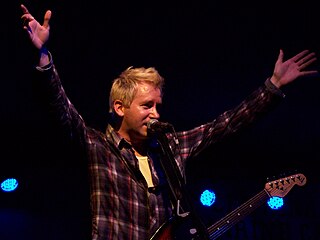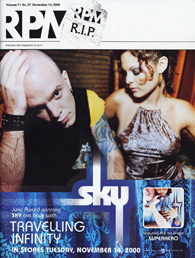Related Research Articles

Klaatu was a Canadian rock group formed in 1973 by the duo of John Woloschuk and Dee Long. They named themselves after an ambassador, Klaatu, from an extraterrestrial confederation who visits Earth with his companion robot Gort in the film The Day the Earth Stood Still. After recording two non-charting singles, the band added drummer Terry Draper to the line-up; this trio constituted Klaatu throughout the rest of the band's recording career.

Prism is the debut album by Canadian rock band Prism, released in May 1977 on the Canadian record label GRT. It was produced primarily by Bruce Fairbairn, and the majority of songs were written by Jim Vallance. It achieved platinum status in Canada. Prism peaked at #137 on the Billboard 200 in November 1977.
David Wiffen is an English-Canadian folk singer-songwriter. Two of his songs, "Driving Wheel" and "More Often Than Not", have become cover standards.

I Mother Earth, or IME, is a Canadian rock band formed in 1990 and reaching its peak popularity in the latter half of the 1990s. After an eight-year hiatus, it reunited in 2012. Between 1996 and 2016, it was among the top 150 best-selling Canadian artists and top 40 Canadian bands in Canada.

Wide Mouth Mason is a Canadian blues-based rock band, consisting of Shaun Verreault and Safwan Javed. Former bassist Earl Pereira was also co-founder of Wide Mouth Mason. The band hails from Saskatoon, Saskatchewan and has been active since 1995.

Ridgemont High School is an Ottawa-Carleton District School Board secondary school in Ottawa, Ontario, Canada. The school is located at 2597 Alta Vista Drive in the Alta Vista neighbourhood of Ottawa. It is next door to St. Patrick's High School, a Roman Catholic high school, and Charles Hulse Elementary School, also in the OCDSB.

RPM was a Canadian music-industry publication that featured song and album charts for Canada. The publication was founded by Walt Grealis in February 1964, supported through its existence by record label owner Stan Klees. RPM ceased publication in November 2000.
Skylark was a Canadian pop and rock band active from 1971 to 1973 and based in Vancouver. "Wildflower" is their biggest hit.

Live! is the first live album by the Canadian rock band April Wine. It was released in 1974. The album was recorded in the auditorium of Queen Elizabeth High School in Halifax, Nova Scotia.
Supergarage was a Canadian indie rock band formed in 1995 in Thorold. They released one EP and three full-length albums.
3's a Crowd was a folk rock band from Vancouver who existed from 1964 to 1969, spending most of that time in Toronto and Ottawa. The group had some Canadian chart success, but is particularly notable for the caliber of Canadian musicians who passed through its ranks and would later establish successful careers of their own, including Bruce Cockburn, Colleen Peterson, David Wiffen, Trevor Veitch, and Brent Titcomb. 3's a Crowd is also remembered for its association with Cass Elliott, who co-produced the group's only album.

The Downchild Blues Band is a Canadian blues band, described by one reviewer as "the premier blues band in Canada". The Blues Brothers band was heavily influenced by the Downchild Blues Band.
Jackson Hawke was a Canadian pop rock band, principally active during 1976-1978 and most notable for its song "You Can't Dance", which became an international hit for England Dan and John Ford Coley.

The Jitters were a Canadian rock band formed in Toronto, Ontario in 1981 by Blair Packham, Danny Levy and Matthew Greenberg. Five years of constant performing established them as one of the premier club bands in the Greater Toronto Area.
Julie Ann Masi is a Canadian musician, principally known as a percussionist and vocalist with The Parachute Club. She was also a co-writer of several of the band's songs. She is notable as being part of a female-driven movement mixing music and political activism, emanating from Toronto in the 1980s. She continues to perform and record on occasion.
Richard "Hock" Walsh was one of the first professional blues singers in Canada. He is particularly notable as the co-founder of the Downchild Blues Band and was the original singer of that band's best-known songs.

William Alfred Hawkins was a Canadian songwriter, poet, musician and journalist, most notable for his contributions in the 1960s to Canadian folk rock music and to Canadian poetry. His best known song is "Gnostic Serenade", originally recorded by 3's a Crowd.
The Hunt was a Canadian rock band, mostly made up of musicians who had been members of another Canadian rock band, Dillinger.

James Leroy was a Canadian singer, songwriter, recording artist and performer.
The Canadian Pop Music Encyclopedia is a two volume encyclopedia of Canadian pop music, available in hardcover and online, detailing Canadian music from 1949 onwards.
References
- ↑ Then known as the RPM Awards.
- 1 2 3 4 Jaimie and Sharon Vernon, with notes from Cliff Hierlihy, Don Norman and Richard Patterson, Profile of The Esquires [usurped] . The Canadian Pop Encyclopedia; www.jam.canoe.ca.
- ↑ John Bush, Portrait of The Esquires; www.allmusic.com.
- ↑ Portrait of Don Norman and The Other Four; www.garagehangover.com.
- ↑ At the time, Hawkins had formed the band The Children, which included Bruce Cockburn and which had rapidly developed a national reputation; see William Hawkins. Cockburn later became a member of one of the final versions of The Esquires.
- ↑ Ted Gerow
- ↑ Paul Huot, Andy Legault and Gary Comeau; see Jaimie and Sharon Vernon, with notes from Frank Morrison, Profile of The Townsmen [usurped] . The Canadian Pop Encyclopedia; www.jam.canoe.ca.
- ↑ Douglas Orr and Robert Coulthart
- ↑ Richard Patterson
- ↑ Richard Patterson (post 3's a Crowd), Gary Comeau and Paul Huot
- ↑ Originally to be called the "New Esquires", though name was dropped to avoid confusion with the U.S. rhythm and blues group of the same name; see Jaimie and Sharon Vernon, with notes from Richard Patterson and Doug Grose, Profile of Canada Goose [usurped] . The Canadian Pop Encyclopedia; www.jam.canoe.ca.
- ↑ Gary Comeau, post Canada Goose; see Jaimie and Sharon Vernon, with notes from Richard Patterson and Doug Grose, Profile of Canada Goose [usurped] . The Canadian Pop Encyclopedia; www.jam.canoe.ca.
- ↑ James Leroy was principally active as a Canadian recording artist in 1973-1974, charting several singles and one album, with the group Denim. He committed suicide in 1979, at the age of 32. See Jaimie and Sharon Vernon, with notes from Richard Patterson, Harvey Glatt, George Pollard, Carrie Comeau, Hope Stone and Reg Moore, Profile of James Leroy [usurped] . The Canadian Pop Encyclopedia; www.jam.canoe.ca. See also James Leroy Tribute Website; www.jamesleroy.com.
- ↑ Jaimie and Sharon Vernon, with notes from Richard Patterson and Doug Grose, Profile of Canada Goose [usurped] . The Canadian Pop Encyclopedia; www.jam.canoe.ca.